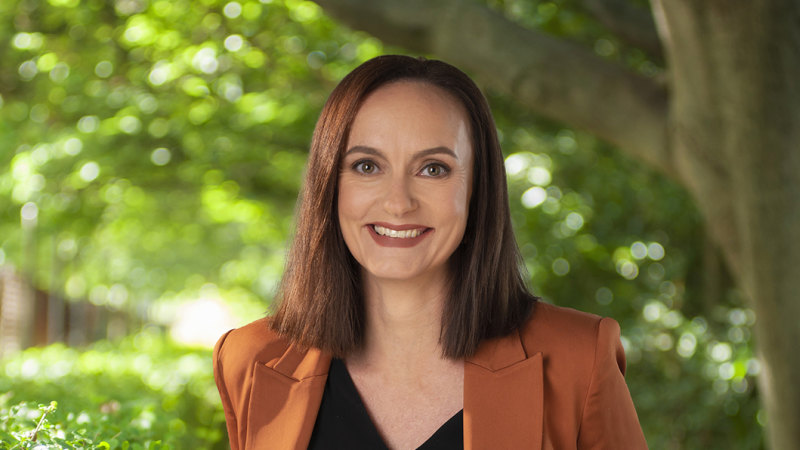More than $1.5 trillion of assets in Australia are now being managed according to responsible investing principles, making up 43 per cent of the total market, as a rising number of investors use their positions as shareholders to agitate for change on ethical and sustainability issues.
The proportion of investment managers using corporate engagement to try and influence the behaviour of companies on environmental, social and governance (ESG) issues has doubled in the past two years from 21 per cent in 2019, to 45 per cent last year. A total of $726 billion in assets was managed using this approach in 2021, compared to $471 billion in 2020.
Estelle Parker from the Responsible Investment the Association Australasia.
The Responsible Investment Association Australasia’s annual benchmark report, released on Monday, found there was $1.54 trillion in responsible investments in Australia in 2021, up from $1.28 trillion in 2020. It also found that 17 per cent of Australians held responsible investments in 2021 (up by 28 per cent from the previous year), driven largely by Gen Xers and Millennials.
The research reviewed the investment practices of 140 financial institutions over the course of 2021, identifying 74 of these as leaders in the field, including well-known brands such as AMP Capital, BetaShares, Fidelity, Janus Henderson, Pendal, Perpetual and UBS; and super funds Active Super, AustralianSuper, Aware Super, Cbus, HESTA and UniSuper.
Emma Herd, climate change and sustainability services partner at Ernst & Young, which helped carry out the research, said there were lessons to be learned from the recent volatility.
“All funds have been down, but a lot of ESG funds have been down less, which is interesting. You’ve also seen simultaneously tech stocks down, and a lot of ESG funds are invested in tech stocks for environmental purposes, so that’s also showed some lessons learned in terms of industry sector concentration risk,” she said.
“It’s a messy market, and different ESG strategies have performed better in the current conditions. But it is very much a short-term issue.”
Responsible investment products that are certified by the association as high-quality and true-to-label were found to have outperformed the overall market in the medium and long term. However, RIAA’s latest figures show the market volatility in 2021 did have an effect on returns.
RIAA’s executive manager of programs Estelle Parker said that there would always be cyclical changes and challenges with the market, but despite a perception that responsible investing performs worse than mainstream funds, this had not been borne out in their research.
“Over the long term those products perform really well,” she said. “And when you’re looking at the Australian market in particular, we have a lot of capital invested in super funds. That, by necessity, tends to be longer term.”
The RIAA research found that there had been a “fervour of activity” when it comes to stewardship and corporate engagement. This was highlighted earlier this year when health industry super fund HESTA used its small stake in AGL to signal that it would vote against the planned demerger of the energy company’s coal-fired power generation business, arguing the move would not help decarbonisation of the economy.
“There’s been a lot of high-profile cases recently where investors are advocating, for example, for strong climate transitions, or they’re advocating for better attention to environmental and social issues,” said Parker.
“Of course, negative screening or divestment is a valid investment strategy and a lot of people will decide that it simply doesn’t fit with their investment strategy or their ethics. But then we’re seeing other investors choosing to stick with those companies and support them in their net-zero transition.”
She also said that increased regulator scrutiny has seen investors become better at backing up the sustainability claims of their portfolio, as they try to avoid being on the wrong side of tightening greenwashing regulations.
The report also noted that a major focus in the ESG space internationally in 2021 was reporting and disclosure, with the launch of the International Sustainability Standards Board at the United Nations Climate Change Conference (COP26).
The next big trend in responsible is likely to be sustainability-themed investments, such as investment in clean energy, green technology, sustainable agriculture, green property, and water and waste technology, the research suggested. These kinds of investments grew from $76 billion in 2020 to $161 billion in 2021.
“I think it is a trend to watch and kind of linked to that on the climate change front is the sustainability-linked loans, which have now reached $19 billion,” said Parker. “We encourage, of course, ambitious targets in relation to those loans, but we need all kinds of capital to be put to work to support the climate change transition, and those sustainability-linked loans, I think, will only grow.”
EY partner Emma Herd.Credit:Dominic Lorrimer
While ESG investing has soared in popularity over the past several years globally, more recently there has been a growing backlash against it, driven by Republican lawmakers, who have labelled it “woke capitalism”. Both Herd and Parker said this it was a concerning trend.
“I think there’s a real risk in misunderstanding the core nature of ESG, that it’s not about pushing an agenda, it is fundamentally about managing for the complete set of financial risks and fulfilling core fiduciary duty,” Herd said.
“I know that a lot of investors in the US markets are extremely concerned about this trend because it signals a desire to explicitly manage the direction of private capital, and I think it will have a really chilling effect in investor appetite to go into those jurisdictions for that precise reason. So, I think it’s one [trend] investors globally are watching very closely because it’s such an extremely dangerous precedent.”
The Business Briefing newsletter delivers major stories, exclusive coverage and expert opinion. Sign up to get it every weekday morning.
Most Viewed in Money
From our partners
Source: Read Full Article


